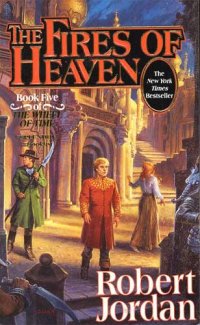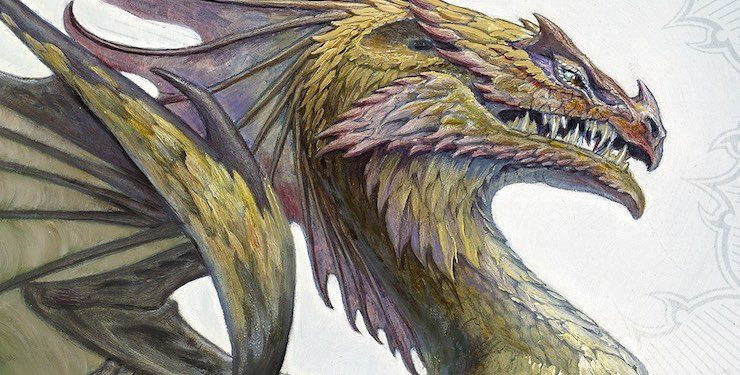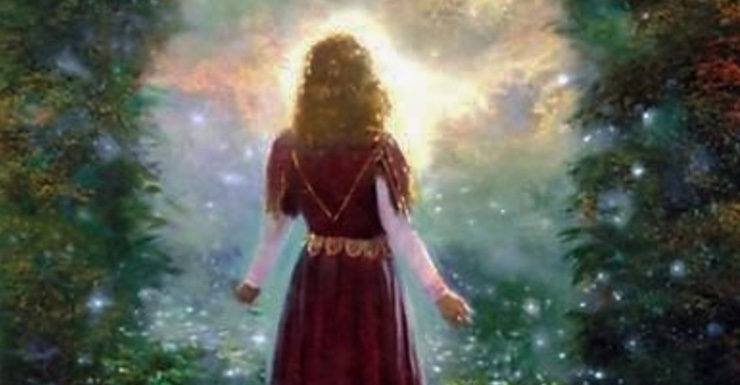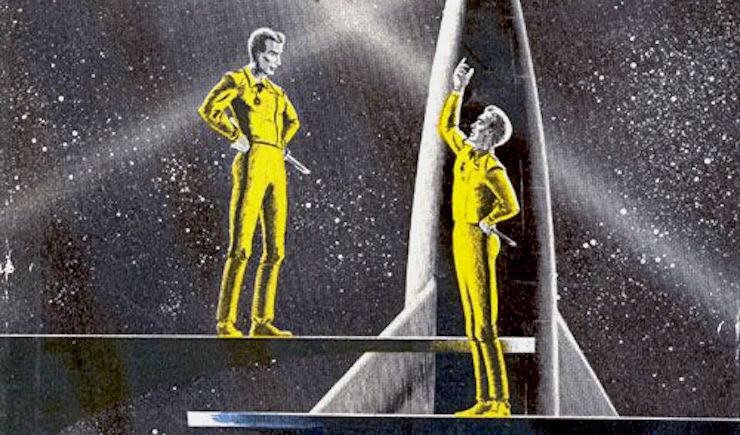Greetings! Hopefully everyone who was in a holiday way this past weekend has recovered from their hangovers and/or questionable-barbecue-meats-induced indigestion, and are scrubbed and ready for another Wheel of Time Re-read post!
So, YOU munch on saltines and chug Gatorade and Pepto, and I will blather to you about Chapters 41-42 of The Fires of Heaven. Deal?
I thought you’d like that!
Previous entries can be found here. This and all other entries contains way big spoilers for all currently published novels in the Wheel of Time series, so if you haven’t read, go read and then come back. We’ll still be here. Swear!
So let’s get to it, shall we?
 Chapter 41: The Craft of Kin Tovere
Chapter 41: The Craft of Kin Tovere
What Happens
Rand stands on a hilltop and surveys his forces camped below, noting the three camps: Tairen, Cairhienin horse, and Cairhienin infantry, all as ready to fight each other as the Shaido surrounding the city. He in turn examines their nominal commander, High Lord Weiramon, flanked by two younger Tairen lords; Rand thinks it was good that Weiramon had pushed his forces to arrive at Cairhien once he’d heard of the Aiel invasion, but bad that the man fully expected to defeat the Shaido just with what he had, and worse that he had just as much contempt for Rand’s Aiel.
One Aiel was no different from another to Weiramon. To the others, too, for that matter. One of the young lords pointedly sniffed a scented silk handkerchief whenever he looked at an Aiel. Rand wondered how long the fellow would survive. And what Rand would have to do about it when he died.
Weiramon sees Rand looking and reiterates his opinion that one good charge would scatter the Shaido “like quail”, and Rand cuts him off to ask if he is certain about the news from Tear. Weiramon is sure, but dismissive of the notion that the Illianers are moving on Tear with any official backing, and Rand politely ignores him, thinking it made no difference whether or not Weiramon believed Sammael was the one really in charge in Illian. Weiramon goes back to promoting his plan of attack on Cairhien, and Rand brushes by him, mentally deciding he is a fool. He sees Aviendha talking with a dozen Wise Ones, and she smiles at him briefly; she had been much friendlier since that night (except the one time he had brought up marriage again), but nothing more. Rand thinks it bizarre that she seems so relaxed around him now, while he was tenser than ever; he’s also surprised the Maidens haven’t seemed to have spread their certainty about his and Aviendha’s relationship to anyone else.
Sighing, he walked on, still not listening to Weiramon. One day he was going to understand women. When he had the time to apply to it. He suspected a lifetime would not be enough, though.
Rand passes Mangin, who asks him cheerfully if he would like to go hunting “sheep in a sack”, with a wry glance at the Tairens that they miss completely; Rand refuses politely, and reflects that it would have been easy to make friends with Mangin if he’d only had the time. He reaches the highest part of the hill, where Cairhienin refugees have built him a tower platform over twenty spans high. Moiraine, Lan, and Egwene are at the foot of the ladder, and Rand asks Egwene if she has decided; she hesitates and avoids looking at Moiraine as she replies that she will do what she can. Rand hadn’t thought it would be a problem for her to help him against the Shaido, since unlike Moiraine she hadn’t taken the Three Oaths which prevented the Aes Sedai from using the One Power against the Shaido, but the request had greatly upset her. Moiraine’s disapproval is silent but obvious, and as he prepares to climb the ladder, she suddenly asks why he is wearing a sword again; caught off guard, Rand just mutters “Why shouldn’t I?” and keeps going. Rhuarc and the other chiefs follow him up, and then Lan, but Weiramon stays below, as does Moiraine and Egwene. A Cairhienin craftsman named Kin Tovere is up top, berating his two apprentices as they align the second of the two large looking glasses on the tower. The apprentices give starts at the sight of the Aiel, and then bow very low to Rand; Tovere bows as well, but his manner is gruffly respectful rather than awed or fawning as he tells Rand that this tower was a wonderful idea, and if Rand gives him time, he’ll build a glass that can see all the way to Caemlyn. Rand thanks him, and gently suggests that he take his still-bent-double apprentices down.
The apprentices barely straightened enough to follow him, gazing round-eyed at Rand even more than at the Aiel as they vanished down the ladder. Cail was a year older than he, Jol two. Both had been born in bigger towns than he had imagined before leaving the Two Rivers, had visited Cairhien and seen the king and the Amyrlin Seat, if at a distance, while he was still tending sheep. Very likely, they still knew more of the world than he in some ways. Shaking his head, he bent to the new looking glass.
He studies Cairhien, and sees that the Foregate has burned down completely, and that the towers in the city proper fly either the crescents of Tear or the Dragon banner, not one rising sun banner to be seen. He sees a group of Shaido surrounding a man whose arms seem to glitter, and is sure it’s Couladin. Then he is startled by two spears shot from the city walls that actually reach Couladin’s group and kill some of them, to their shock and Rand’s, since they should be far out of range of any spear throw. He looks at Rhuarc, who had been looking through the other glass, and asks if he saw that; Rhuarc nods, just as puzzled as he, and remarks it was too bad none of the ones who fell was Couladin. Rand is not so sure Couladin deserves such an easy way out, and strokes his sword hilt.
Commentary
Ugh, Weiramon. There’s someone like him in just about every single war story I’ve ever read. They tend to vary in their specifics according to the author’s personal politics (or whatever qualities particularly pisses the author off), but it doesn’t matter whether this character is the bigoted warmongering martinet, the bleeding heart obstructionist pacifist, or the blusteringly incompetent beneficiary of nepotism/noble birth; he or she can always be defined, more or less, as The Guy Who’s Going To Fuck This Up. And every time, I want to kick them in the head. Repeatedly.
Despite the disparity of their particular ideological biases, these characters generally share a base similarity, in that they all appear to enjoy a certain freedom from the burdens of reality. In other words, the world is the way they see it, and it cannot be any other way, and if something is not that way, then that thing is Wrong. This is a brand of shiny impenetrable willful blindness that cheerfully transcends all political, religious, and cultural dividers. These idiots are everywhere, and they will inevitably wreak havoc. This is why the world has problems.
Stepping off the soapbox for a moment, despite my general contempt for Weiramon (that Rand shares this contempt immensely solidifies my good opinion of him), I never once thought he could be a Darkfriend. I could see him being an unwitting dupe for the Shadow, but actually a chartered member, no. Partially because it would be too obvious, but mostly because I can’t imagine why the Dark Side would want him. Far better to let him screw things up for the Light, I would think.
I honestly cannot remember at the moment what the hell actually happens to Weiramon later on, but I think I would remember if he’d been killed (because I would remember the “YAY!”), so I’m assuming he’s still alive and obnoxious as of KOD. If he’s done something to disprove my theory of “too stupid to be a Darkfriend” in the interim I shall be very Put Out.
This chapter does a lot to more sharply pinpoint at what stage the state of technology in Randland actually is, and brings home the fact that despite many people (including myself) referring to it as a “medieval” world, it really is not one. The presence of telescopes and clocks, as well as the evidence of widespread literacy and the relatively common availability of books (which argues for the presence of printing presses, though I don’t know if they are ever specifically mentioned in the narrative) pegs Randland as more of a Renaissance-level setting than anything else. And, of course, someone’s inventing the better spear launcher in Cairhien as we speak. This is something we will come back to later, especially once we meet Herid Fel.
 Chapter 42: Before the Arrow
Chapter 42: Before the Arrow
What Happens
Mat stares at the roof of his tent, thinking that matters have gone beyond serious.
I am no bloody hero, he thought grimly, and I’m no bloody soldier. Fiercely he pushed down a memory of walking fortress walls, ordering his last reserves to where another crop of Trolloc scaling ladders had sprung up. That was not me, the Light burn whoever it was! I’m… He did not know what he was — a sour thought — but whatever he was, it involved gambling and taverns, women and dancing. That he was sure of. It involved a good horse and every road in the world to choose from, not sitting and waiting for somebody to shoot arrows at him or try to stick a sword or a spear through his ribs. Any different would make him a fool, and he would not be that, not for Rand or Moiraine or anybody else.
He thinks that he’s tired of seeming to get all the burdens of being ta’veren without any of the benefits, and says aloud that it’s time for him to go; Rand doesn’t need him anymore. He knows that that’s not true, exactly, and that he and Perrin were both tied up in some way with Rand and Tarmon Gai’don, and then there is the Horn of Valere, but he hopes the time for that is a long way off, and now for the first time he can say he’s leaving without feeling that pull back to Rand or being diverted by the smallest thing. He tries to convince himself that Rand can take care of himself, and leaves the tent. He crosses the camp, noting Kadere’s wagons surrounded by Aiel guards, and wonders if Rand realizes he’s giving Moiraine everything she wants. He reaches Rand’s tent and ducks inside, only to find it empty except for the gleeman Natael, and realizes Rand is probably still at the tower, an idea which Mat approves of.
Know the terrain. That was the second rule, close behind “Know your enemy,” and not much to choose between them.
The thought put a sour twist to his mouth. Those rules came from other men’s memories; the only rules he wanted to remember were “Never kiss a girl whose brothers have knife scars” and “Never gamble without knowing a back way out.” He almost wished those memories of other men were still separate lumps in his brain instead of oozing into his thoughts when he least expected.
Natael inquires lazily if he’s having stomach troubles, and Mat grimaces and asks if Rand will be back soon. Natael shrugs and replies the Lord Dragon will be back when he wants, and Mat tells him he’ll wait. Natael studies him, and Mat moves to study the maps laid out on the floor in an effort to ignore him. He winces as the counters on the maps tell him that Couladin has almost a hundred and sixty thousand spears with him, and the undecided clans behind them total almost the same. Rand has twice the numbers of either one, which was fine if he didn’t have to fight them both at once. But that might be what he had to fight.
“A pretty situation, wouldn’t you say?”
Mat’s head jerked up at Lan’s voice, but the Warder had entered the tent alone. “Just something to look at while I waited. Is Rand coming back?”
Lan says Rand will be along soon, and remarks that tomorrow should be the largest battle since Artur Hawkwing. Mat makes a noncommittal reply, and asks about the undecided clans, but Lan says no one knows yet what they’ll do; the only thing for sure is that Couladin is going nowhere. Mat almost leaves, but decides to wait, uncomfortably hoping Lan will stay silent, but Lan turns to Natael and asks what he thinks: should they rush down on the Shaido with everything they have tomorrow? Natael replies sourly that it sounds as good as anything else to him; he leads no armies.
Mat grunted, and Lan glanced at him before returning to his study of the maps. “You do not think it a good plan? Why not?”
He said it so casually that Mat answered without thinking. “Two reasons. If you surround Couladin, trap him between you and the city, you might crush him against it.” How long was Rand going to be? “But you might push him right over the walls, too. From what I hear, he’s nearly gotten over twice already, even without miners or siege engines, and the city is hanging on by its teeth.” Say his piece and go, that was it. “Press him enough, and you’ll find yourself fighting inside Cairhien. Nasty thing, fighting in a city. And the idea is to save the place, not finish ruining it.” Those slips laid out on the maps, the maps themselves, made it all so clear.
He frowns and squats down, fascinated in spite of himself, and says it’s better to shove the Shaido away instead: hit them from the south, with a blocking force to channel them to the River Gaelin and force them across the bridges.
It was like Cuaindaigh Fords, too, late in the Trolloc Wars, and on much the same scale. Not much different from the Tora Shan, either. Or Sulmein Gap, before Hawkwing found his stride. The names flickered through his head, the images of bloody fields forgotten even by historians. Absorbed in the map as he was, they did not register as anything but his own remembrances.
He adds that it’s too bad they don’t have more light cavalry for the harrying, but Aiel should do as well. Lan asks quietly for the other reason, and Mat snorts and replies that Lan knows as well as he does that if any of the undecided clans decide to come in on Couladin’s side, they’ll take Rand’s force from behind while Rand’s people are still dealing with the Shaido. The only thing to do is take only half the force against Couladin, just in case, which makes it an even fight, but at least Couladin still has to worry about a sortie from the city. The other half should be split as the blocking force to channel Couladin and the rest between the undecided clans and the city. Lan approves this as very neat, as long as all four clans do not come in with the Shaido.
Mat laughed aloud. “Everything always changes. The best plan lasts until the first arrow leaves the bow. This would be easy enough for a child to handle, except for Indirian and the rest not knowing their own minds. If they all decide to go over to Couladin, you toss the dice and hope, because the Dark One’s in the game for sure. At least you’ll have enough strength clear of the city nearly to match them. Enough to hold them for the time you need. Abandon the idea of pursuing Couladin and turn everything on them as soon as he’s well and truly begun crossing the Gaelin. But it’s my bet they’ll wait and watch, and come to you once Couladin is done for. Victory settles a lot of arguments in most men’s heads.”
Mat realizes the music has stopped, and turns to see Natael staring at him like he had never seen him before, and suddenly realizes what he has been saying and curses himself for a fool. He wonders angrily why Lan had picked now to be talkative all of a sudden.
At least he had not been babbling in the Old Tongue. Blood and ashes, but I hope I wasn’t!
He turns to go and finds Rand standing just inside the tent; Mat wonders how long he had been standing there, decides it doesn’t matter, and blurts out that he is leaving at first light. Rand replies he’ll be sorry to see him go. Mat blinks in surprise, and Rand adds that he never tried to make Mat stay, which Mat concedes.
Rand had never tried to make him stay, true. He had just done it without trying. But there was not the slightest bit of ta’veren tugging, now, no vague feelings that he was doing the wrong thing. He was firm and clear in his purpose.
Rand asks where he will go, and Mat says south, not that there is much choice in the matter; this is no place for him. He says he doesn’t know anything about battles and doesn’t want to know, and promises mentally to punch Natael or Lan in the mouth if either of them say anything, but both keep silent. Rand wishes him a pleasant journey and shakes Mat’s hand, and Mat leaves the tent to find a crowd of Maidens outside, along with all the clan chiefs and the three Tairen lords, who eye him disdainfully and then dismiss him from consideration. Mat glares at them until the two younger ones look uneasy, then takes off, feeling much better about everything; the dice seem to be spinning in his head.
Rand stares at the tent flap for a moment, then remarks that he only heard the last bit; was it all like that?
“Very nearly,” Lan replied. “With only a few minutes to study the maps, he laid out close to the battle plan that Rhuarc and the others made. He saw the difficulties and the dangers, and how to meet them. He knows about miners and siege engines, and using light cavalry to harry a defeated foe.”
Rand notes that Lan does not seem very surprised, nor does he ask the obvious question, for which Rand is grateful. He wonders what miners have to do with battles, but thinks the more important thing is that he’s now sure Mat had gained more in that doorframe ter’angreal than a tendency to spout the Old Tongue occasionally, and that he would make use of it. He grimaces at his own callousness, and hopes Mat and Perrin both enjoy themselves as much as possible while they’re free of him.
Moiraine had named it no coincidence, three such growing up in the same village, all nearly the same age; the Wheel wove happenstance and coincidence into the Pattern, but it did not lay down the likes of the three of them for no reason. Eventually he would pull his friends back to him, however far they went, and when they came, he would use them, however he could. However he had to. Because he did have to. Because whatever the Prophecy of the Dragon said, he was sure the only chance he had of winning Tarmon Gai’don lay in having all three of them, three ta’veren who had been tied together since infancy, tied together once more.
He grimly commands Natael to play “March of Death”, something to make even his soul weep, if he still has one. Natael goes pale and obeys, and Rand asks Lan to send in the others; Lan makes a formal bow before leaving, which he had never done before, but Rand only notices absently, thinking that it was a polite fiction that he had helped plan this battle, and he was not ready for it.
I’ve planned a hundred battles this size or more and given orders that led to ten times as many. Not his thought. Lews Therin knew war — had known war — but not Rand al’Thor, and that was him.
The chiefs file in, and the Tairens follow, affronted that they were not given precedence; Weiramon moves behind Rand, muttering furiously, which the Aiel do not like at all. Finally Weiramon sits down, and Rand sees that at least one of his lackeys has the grace to look embarrassed at his behavior. Rand makes a mental note to do something about Weiramon, and they begin tactical adjustments to their plan; the chiefs and even the Tairens seem affected by the mournful music, but Rand knows that tears are no longer a luxury he can afford.
Commentary
Back in the day, sometimes when I was bored I would pick up various WOT novels and skip through them and reread my most favorite parts. So guess, if you will, where my paperback of TFOH falls open to naturally.
Did you guess it was this chapter? I bet you guessed it was this chapter. I certainly hope you did, anyway, since I made the answer kind of completely bleeding obvious, eh?
Yeah. Hands down, no question, one of my absolute favorite chapters in the entire series, right here. Love love love happy dance aw yeah.
You remember a loooooong time ago when I was talking about self-realization moments, and how they’re my favorite thing ever? Well, that’s still true, but self-realization moments are twenty-two million billion times more fun when done with an audience (of other characters, I mean) to do the realizing along with the character. Those are the BEST. And this is one of my favorite examples of it. The secret badassery is unmasked, ha!
Part of the reason this scene works so well is that it’s so masterfully set up and blocked, and the reveal just perfectly executed. I’ve seen other sf authors have moments similar to this and positively mangle them (an unforgivable error, in my book); it’s harder than it looks to get everything to fall into place so that turning point of “Oh” in the scene hits just right, for both the character(s) and the reader. A very large part of the reason I love this series as much as I do is because Jordan has got these kinds of scenes DOWN.
The other reason why this works is the unmistakable ring of authenticity in Mat’s spiel. I ain’t no military historian, nor am I any kind of tactician, but I’ve been reading stories with battles set in historical and quasi-historical and just-plain-made-up-but-did-the-research settings for most of my life, and you do pick up a few things. Anvil-and-hammer tactics (and ways to circumvent them) have been around since war has been around, so maybe I’m being easily impressed here, but Mat’s battle plan strikes me as having been written by someone who very much knows of what they speak. Hardly surprising, given Jordan’s background, but there you are. Verisimilitude FTW!
Love love love happy dance aw yeah.
Rand has a couple of nice moments in this chapter too, with the Lan bowing and all, but the main thing that struck me about his POV section is the Lews Therin quote, which seems to me like the first time Lews Therin says something that could be construed as a statement “to” Rand, as a separate entity, rather than just kind of generally directed at the world (or popping up as not a thought so much as a bit of knowledge or a memory). Which is a nice bit of foreshadowing for what’s about to happen.
…Which we will get to next time, so as to keep all the battle bits bodaciously bunched. Like bananas! So see you Wednesday!














